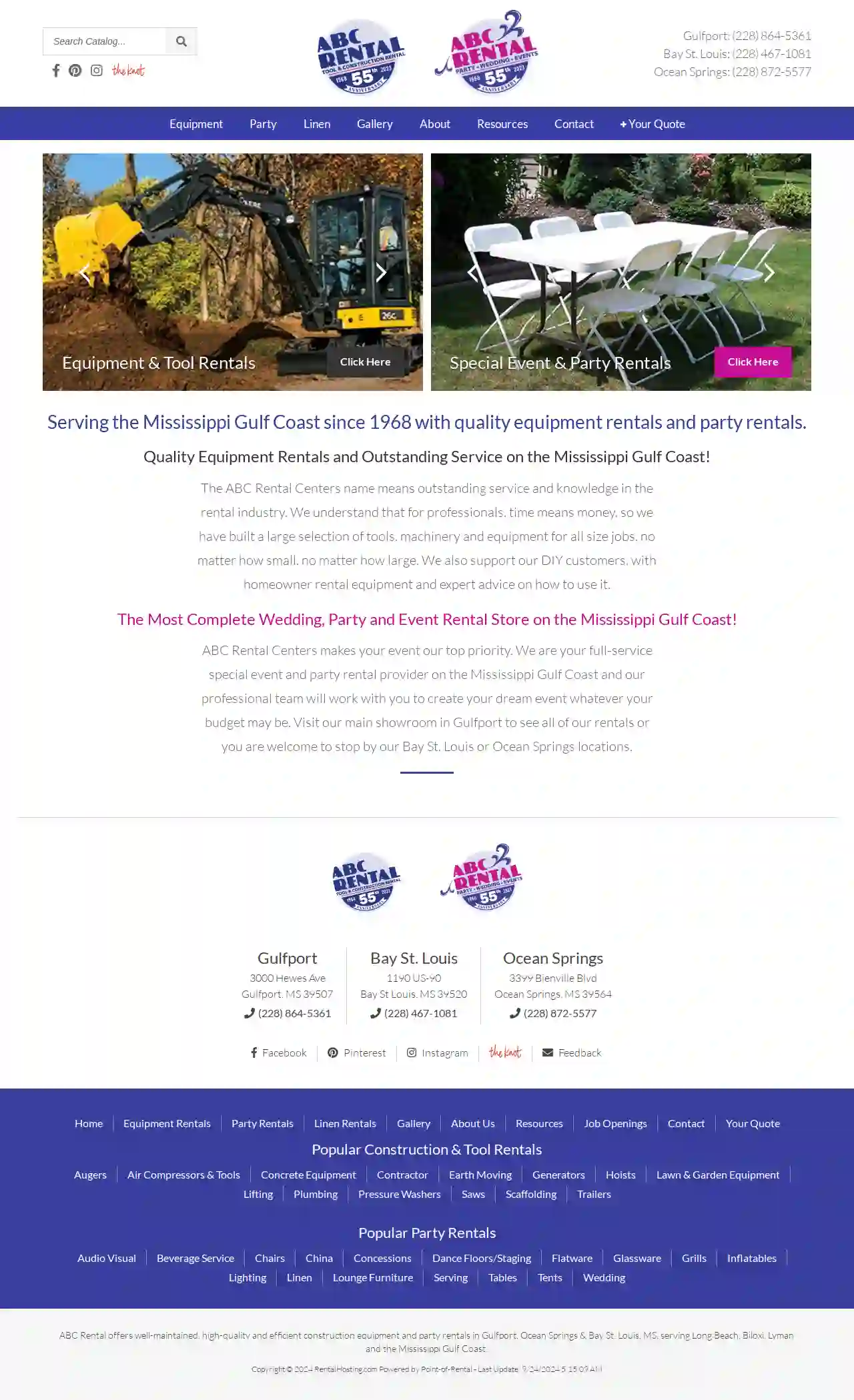Scaffolding Companies Ellisville
Find Scaffolding Erectors in Ellisville
Receive up to 3 Construction Scaffolding quotes for your project today! Compare profiles, reviews, accreditations, portfolio, etc... and choose the best offer.
Service Needed
City or Town

ABC Rental Center
4.4151 reviews3399 Bienville Blvd, Ocean Springs, 39564, USABC Rental offers well-maintained, high-quality and efficient construction equipment and party rentals in Gulfport, Ocean Springs & Bay St. Louis, MS, serving Long Beach, Biloxi, Lyman and the Mississippi Gulf Coast. With a wide range of equipment and party rentals, ABC Rental is dedicated to providing outstanding service and knowledge in the rental industry.
- Services
- Why Us?
- Gallery
Get Quote- Ma
Magnolia Masonry of South Mississippi LLC
4.914 reviewsGulfport, US- Services
- Why Us?
Get Quote - Cr
Crom Equipment Rentals Inc
Gulfport, US- Services
- Why Us?
Get Quote - Th
The Home Depot
4.2Gulfport, US- Services
- Why Us?
Get Quote - Lo
Lowe's Home Improvement
4.1Gulfport, US- Services
- Why Us?
Get Quote
Over 2,353+ Scaffolding Contractors onboarded
Our scaffolding contractors operate in Ellisville and surroundings!
ScaffoldingHQ has curated and vetted the Best Scaffolding Contractors arround Ellisville. Find a top & trustworthy pro today.
Frequently Asked Questions About Scaffolding Companies
Find answers to common questions about scaffolding companies and hiring scaffolding contractors in the USA.
- Size and Complexity: Larger, more intricate scaffolding structures will naturally take longer to assemble.
- Scaffolding Type: System scaffolding, with its pre-engineered components, can be erected faster than traditional tube and clamp scaffolding.
- Accessibility: Difficult site access or limited working space can prolong the erection process.
- Crew Size and Experience: The number and skill level of the scaffolding erectors will impact the speed of assembly.
- Mobile Elevated Work Platforms (MEWPs): Scissor lifts, boom lifts, and other MEWPs offer flexible access for specific tasks.
- Mast Climbing Work Platforms (MCWPs): Ideal for high-rise construction, providing a stable working platform that can be raised incrementally.
- Suspended Access Equipment: Ropes and harnesses used for specific tasks like window cleaning or façade repairs.
- Ladders and Step Ladders: For shorter durations and limited working heights, provided they are used safely and appropriately.
- Always Wear a Safety Harness: Connect your harness to a secure anchor point at all times to prevent falls.
- Keep Platforms Clear: Remove tools, materials, and debris to avoid tripping hazards.
- Never Overload the Scaffolding: Stay within the designated weight limits.
- Be Aware of Your Surroundings: Pay attention to power lines, moving equipment, and other potential hazards.
- Inspect Before Use: Check the scaffolding for any damage or defects before starting work.
- Communicate Clearly: Use hand signals and clear communication to coordinate with other workers.
- Follow Safety Training: Attend and understand all safety training provided by your employer or the scaffolding company.
How long does it take to erect scaffolding?
The erection time for scaffolding depends on factors such as:
What are some alternatives to traditional scaffolding?
Depending on the project, these alternatives may be suitable:
Can I erect scaffolding myself?
While it might seem tempting to save money, it's strongly recommended NOT to erect scaffolding yourself unless you are a trained and competent scaffolding erector. Scaffolding erection requires specialized knowledge, skills, and tools to ensure safety and structural stability. Incorrectly erected scaffolding can lead to serious accidents. Always hire a qualified and experienced scaffolding company to handle the installation and dismantling of scaffolding.
What are some tips for working safely on scaffolding?
Working on scaffolding can be hazardous. Follow these safety tips:
How long does it take to erect scaffolding?
The erection time for scaffolding depends on factors such as:
- Size and Complexity: Larger, more intricate scaffolding structures will naturally take longer to assemble.
- Scaffolding Type: System scaffolding, with its pre-engineered components, can be erected faster than traditional tube and clamp scaffolding.
- Accessibility: Difficult site access or limited working space can prolong the erection process.
- Crew Size and Experience: The number and skill level of the scaffolding erectors will impact the speed of assembly.
What are some alternatives to traditional scaffolding?
Depending on the project, these alternatives may be suitable:
- Mobile Elevated Work Platforms (MEWPs): Scissor lifts, boom lifts, and other MEWPs offer flexible access for specific tasks.
- Mast Climbing Work Platforms (MCWPs): Ideal for high-rise construction, providing a stable working platform that can be raised incrementally.
- Suspended Access Equipment: Ropes and harnesses used for specific tasks like window cleaning or façade repairs.
- Ladders and Step Ladders: For shorter durations and limited working heights, provided they are used safely and appropriately.
Can I erect scaffolding myself?
While it might seem tempting to save money, it's strongly recommended NOT to erect scaffolding yourself unless you are a trained and competent scaffolding erector. Scaffolding erection requires specialized knowledge, skills, and tools to ensure safety and structural stability. Incorrectly erected scaffolding can lead to serious accidents. Always hire a qualified and experienced scaffolding company to handle the installation and dismantling of scaffolding.
What are some tips for working safely on scaffolding?
Working on scaffolding can be hazardous. Follow these safety tips:
- Always Wear a Safety Harness: Connect your harness to a secure anchor point at all times to prevent falls.
- Keep Platforms Clear: Remove tools, materials, and debris to avoid tripping hazards.
- Never Overload the Scaffolding: Stay within the designated weight limits.
- Be Aware of Your Surroundings: Pay attention to power lines, moving equipment, and other potential hazards.
- Inspect Before Use: Check the scaffolding for any damage or defects before starting work.
- Communicate Clearly: Use hand signals and clear communication to coordinate with other workers.
- Follow Safety Training: Attend and understand all safety training provided by your employer or the scaffolding company.